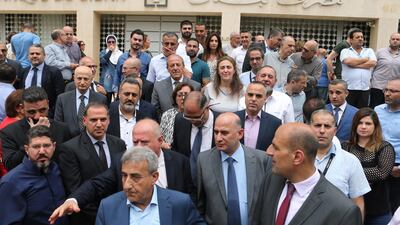Lebanon's Cabinet plans to cap salaries for top-earning government employees and may halve the pay of MPs and ministers, after reports of public-sector pay cuts in the 2019 draft budget triggered nationwide protests.
The maximum salary in the public sector will be limited to 20 times the national minimum wage, or 13.5 million Lebanese pounds (Dh32,890) a month in the draft budget, which is being discussed by the Cabinet, Information Minister Jamil Jarrah said on Wednesday.
Budget discussions are scheduled to end on Friday, after which it will be sent to Parliament for approval.
Mr Jarrah has not confirmed reports that the Cabinet was considering cutting the salaries of MPs, ministers and the president by 50 per cent, saying only that “there is an atmosphere tending towards salary cuts because one must start with oneself”.
Lebanese MPs are among the highest paid in the world compared to the national minimum wage, said a report published in 2017 by Lebanese non-profit Legal Agenda.
An MP earns 18 times the minimum salary of $450 (Dh1,652) a month. Members in Tunisia, Iraq and Jordan earn 15 times the minimum wage, but only six times as much in Britain.
The sum varies depending on the number of terms served.
Controversially, MPs continue receiving a salary for life and their family also receive monthly compensation when they die.
The country’s leader also has a salary for life, but that is not considered as problematic because most presidents around the world do.
The draft budget states that the president's salary is equal to 12.5m pounds, but local newspapers report that that it reaches 18.7m pounds.
Analysts say that this is because President Michel Aoun accumulates compensation for earlier serving as an MP, Prime minister and army commander.
The Speaker of Parliament and Prime Minister each earn 17.7m pounds a month, while ministers’ salaries go as high as 12.9m pounds.
In total, the state spends 58bn pounds a year on MPs, ministers and the president, Al Akhbar daily reported, quoting Beirut consultancy Information International.
The idea of reducing politicians' pay has been floated for a long time but has never been introduced.
In 2012, one Lebanese party, the Kataeb, also known as the Phalange, suggested cutting by up to 50 per cent the salaries of MPs who did not attend parliamentary sessions, to discourage absenteeism.
But lowering salaries would not lead to a significant reduction in the budget deficit, which reached 11.2 per cent of GDP in 2018.
Its only aim is to "throw ashes over the eyes of the people and justify any actions that may affect the poor and the middle class", Al Akhbar said.
The strikes and demonstrations have spread across the country since the government started hinting that the public-sector wages could be cut.
The first-ever strike by employees of the central bank on Friday and Monday led to commercial banks limiting daily withdrawals at ATMs and closed the Beirut Stock Exchange for two days.
Experts argue that the best way to reduce spending on public sector salaries is to tackle fictitious names on payrolls.
The exact number of civil servants is not known but Sami Nader, director of the Levant Institute for Strategic Affairs, estimated that about 10 per cent of Lebanese work for the state.
About 35 per cent of total expenses go towards salaries and pensions, a little above debt service of 34 per cent, Mr Nader said.
Economist Jean Tawile estimated that there were about 60,000 “ghost” employees, or people put on the government payroll without actually doing any work.
Despite this, UN statistics show that one third of Lebanese live on less than $270 a month.
The Cabinet has also been discussing a tax on buildings built along the seafront during the 1975-1990 civil war, in breach of a law that stipulates the shore must remain open to the public.
“This idea was approved in 2018 and should have brought in $100m in yearly fines to the state, but nothing has been done yet," Mr Tawile said.
Asked about this on Wednesday, Mr Jarrah said: “There are around 60 files being examined at the Finance Ministry. Some of them are incomplete. Efforts to resolve the issue are ongoing."

